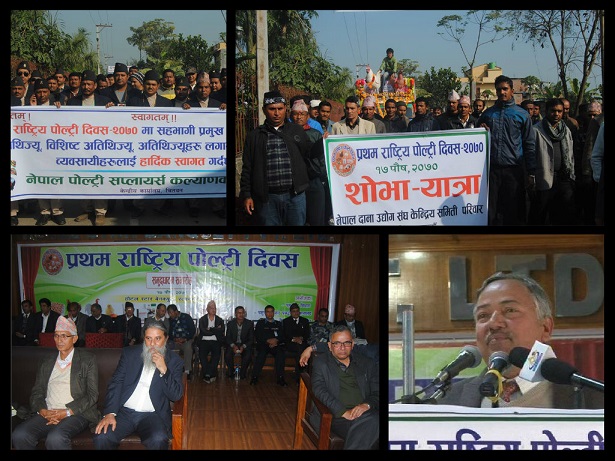No module Published on Offcanvas position
Celebration of First National Poultry Day in Nepal
 First time in Nepal, first day of January 2014 (17th Poush, 2070BS) was declared as National Poultry Day. This day's grand celebration was made jointly by farmers, hatchery entrepreneurs, veterinarians, agriculturalists, government service officers and people involving in poultry farming from different parts of Nepal in my own hometown, Chitwan district, on the chairmanship of Mr. Guna Chandra Bista (First Nepali Poultry Entrepreneur).
First time in Nepal, first day of January 2014 (17th Poush, 2070BS) was declared as National Poultry Day. This day's grand celebration was made jointly by farmers, hatchery entrepreneurs, veterinarians, agriculturalists, government service officers and people involving in poultry farming from different parts of Nepal in my own hometown, Chitwan district, on the chairmanship of Mr. Guna Chandra Bista (First Nepali Poultry Entrepreneur).In the context of Nepal, poultry is an emerging sector, as it is self sufficient in feed, day old chicks, broiler meat and eggs, available in all major urban and semi urban and in rural areas as livestock ; giving a hand to agriculture based family. In addition, poultry has been the cheapest animal protein for human consumption, employment generation and contribution to national GDP, as well as organic poultry manure is gradually replacing the chemical fertilizer. Moreover, poultry shares 11.5% livestock GDP and 4% total GDP, according to Ministry of Agricultural Development.
In spite of the achievements, the existing challenges to poultry sectors are continuous threat of highly pathogenic avian influenza (HPAI), increasing trend of production cost, consumers behavior and satisfaction, and social environment issues which may have subsequently pressurized Government of Nepal (GoN) to take step for the declaration of National Poultry Day in Nepal as government plays a leading role in risk assessment process.
GoN started poultry hatchery in 1960. Since 1960, poultry farming was started but the outbreaks of Bird Flu in 2009 brought the poultry sector to the attention of government and the general public. From then to now, poultry sector has developed a lot, but from the side of GoN, poultry sector was always disappointing; after government declared the National Poultry Day, I personally found that farmers were glad with increased expectation from government level.
However, the main responsibility for disease control should remain with the private sector; having said that, government should implement quarantine act strictly and strengthen internal quarantine; strong research network should be established among NARC (Nepal Agriculture Research Concil), DLS (District Livestock Service) and Universities of Agriculture as well as Veterinary Science.
Dr. Tilchandra Bhattarai, President of Nepal Feed Industry said that We, being the entrepreneurs, are very happy that government declares the National Poultry Day in Nepal and we are looking forward for co-ordination between Government, University and Private Sectors for production of new technology, establishing Ministry of Livestock and Poultry Husbandry and disease control policies.
Being the member of Nepal Veterinary Council, we, the students of B. V. Sc. and A. H. of Agriculture and Forestry University were invited to mark the grand historic day. I was amazed to see huge mass of people who were involved in poultry sector. Being the student, we felt the importance of poultry on Veterinary science. Moreover, its scope was even clearer to us. We can also involve in poultry sector for research purpose after graduation as it has secured future scope in Nepal and all I can say is, for us it was fruitful being a veterinary student.
GoN should implement strict biosecurity measures as Nepal is a landlocked country. Strict rules and strong security should be made so that disease will not transmit. Appropriate veterinary policies and strategies are needed against emerging diseases of poultry, such as the establishment of emergency fund from government level so that farmers will be benefitted. Poultry entrepreneurs, farmers, government and feed industry should have mutual understanding which will consequently strengthen the roots of poultry farming in Nepal.
Related Posts
Comments
No comments made yet. Be the first to submit a comment
By accepting you will be accessing a service provided by a third-party external to https://archive.ypard.net/

